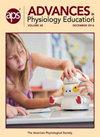医学教育中学生人工智能的滥用与被动性。
IF 1.7
4区 教育学
Q2 EDUCATION, SCIENTIFIC DISCIPLINES
Advances in Physiology Education
Pub Date : 2025-12-01
Epub Date: 2025-09-12
DOI:10.1152/advan.00164.2025
引用次数: 0
摘要
学生不正确或肤浅地使用人工智能(AI)可能会导致或加剧他们的被动。学生的被动状态,其特点是脱离课堂和极少的积极参与,对教育构成了重大挑战,对医学教育产生了显著影响。这篇综述探讨了人工智能对被动的影响,强调了它对批判性思维、临床推理、主动学习和患者参与等基本能力的影响。文章最后提出了在促进有效的人工智能集成的同时减轻这些风险的建议。本文章由计算机程序翻译,如有差异,请以英文原文为准。
AI misuse and passiveness of students in medical education.
NEW & NOTEWORTHY Artificial intelligence (AI) in medical education is a double-edged sword. The negative impacts of AI are more prone to being overlooked. Highlighting these negative potentials is necessary to increase the guided application of AIrelated educational activities by students.
求助全文
通过发布文献求助,成功后即可免费获取论文全文。
去求助
来源期刊
CiteScore
3.40
自引率
19.00%
发文量
100
审稿时长
>12 weeks
期刊介绍:
Advances in Physiology Education promotes and disseminates educational scholarship in order to enhance teaching and learning of physiology, neuroscience and pathophysiology. The journal publishes peer-reviewed descriptions of innovations that improve teaching in the classroom and laboratory, essays on education, and review articles based on our current understanding of physiological mechanisms. Submissions that evaluate new technologies for teaching and research, and educational pedagogy, are especially welcome. The audience for the journal includes educators at all levels: K–12, undergraduate, graduate, and professional programs.

 求助内容:
求助内容: 应助结果提醒方式:
应助结果提醒方式:


